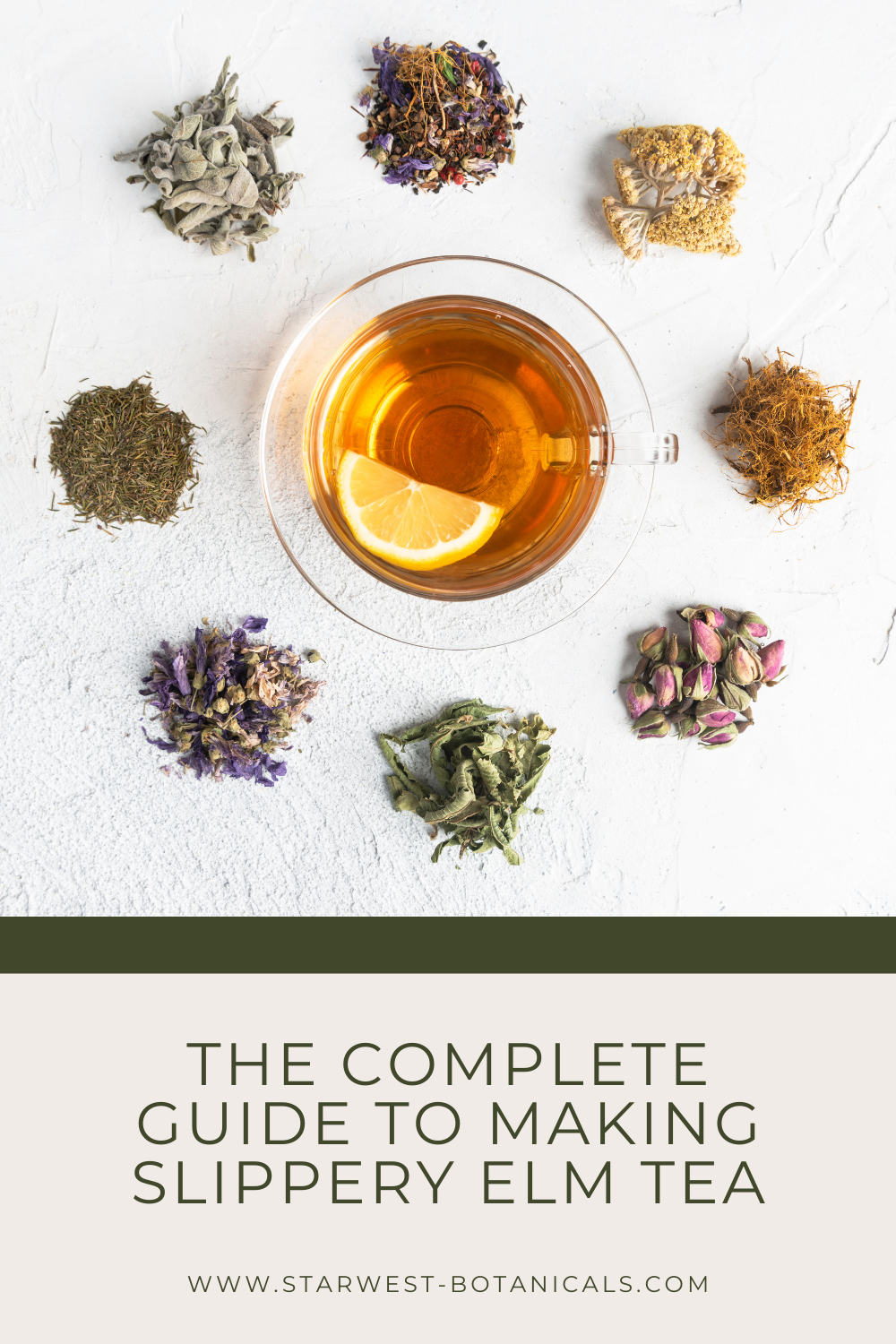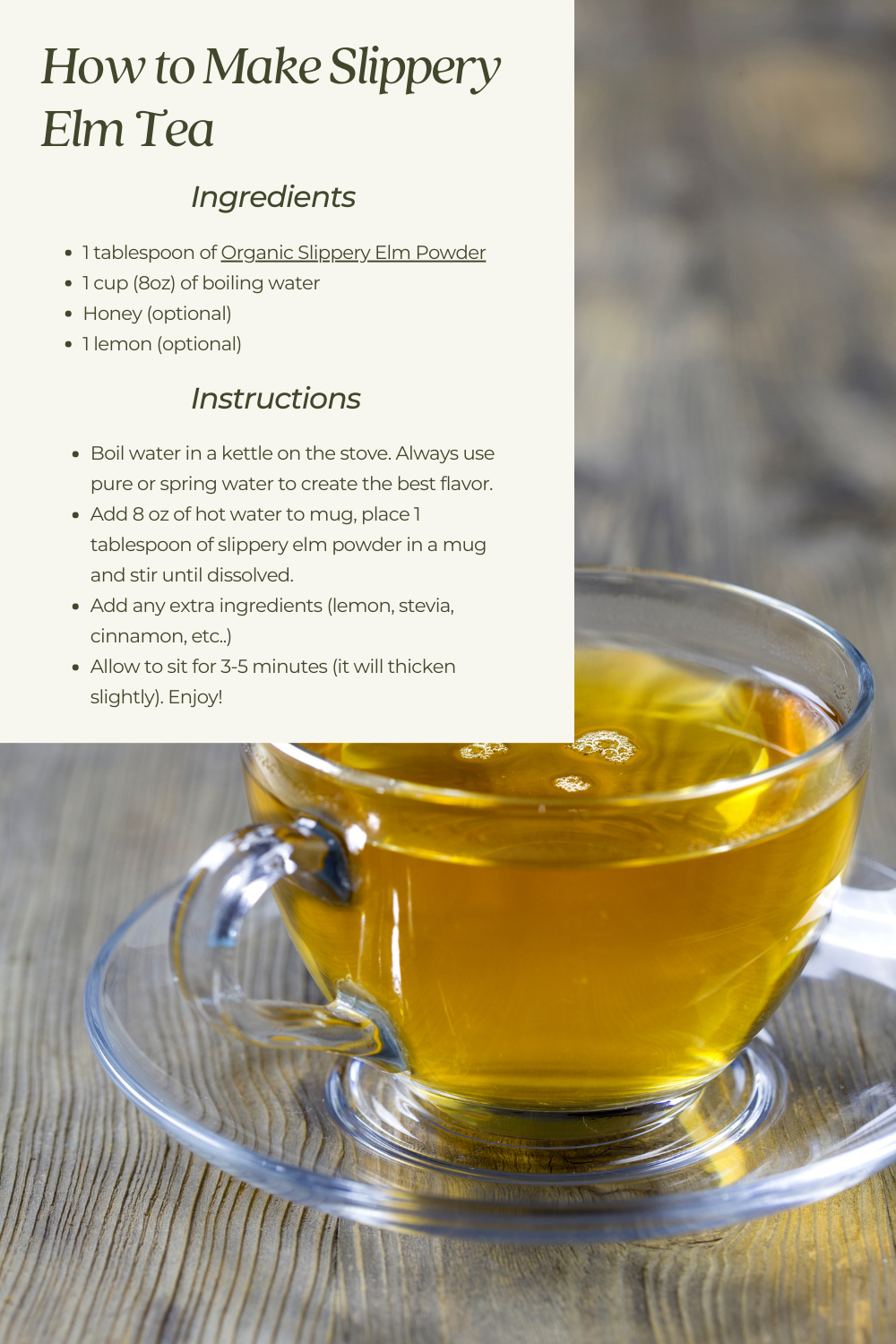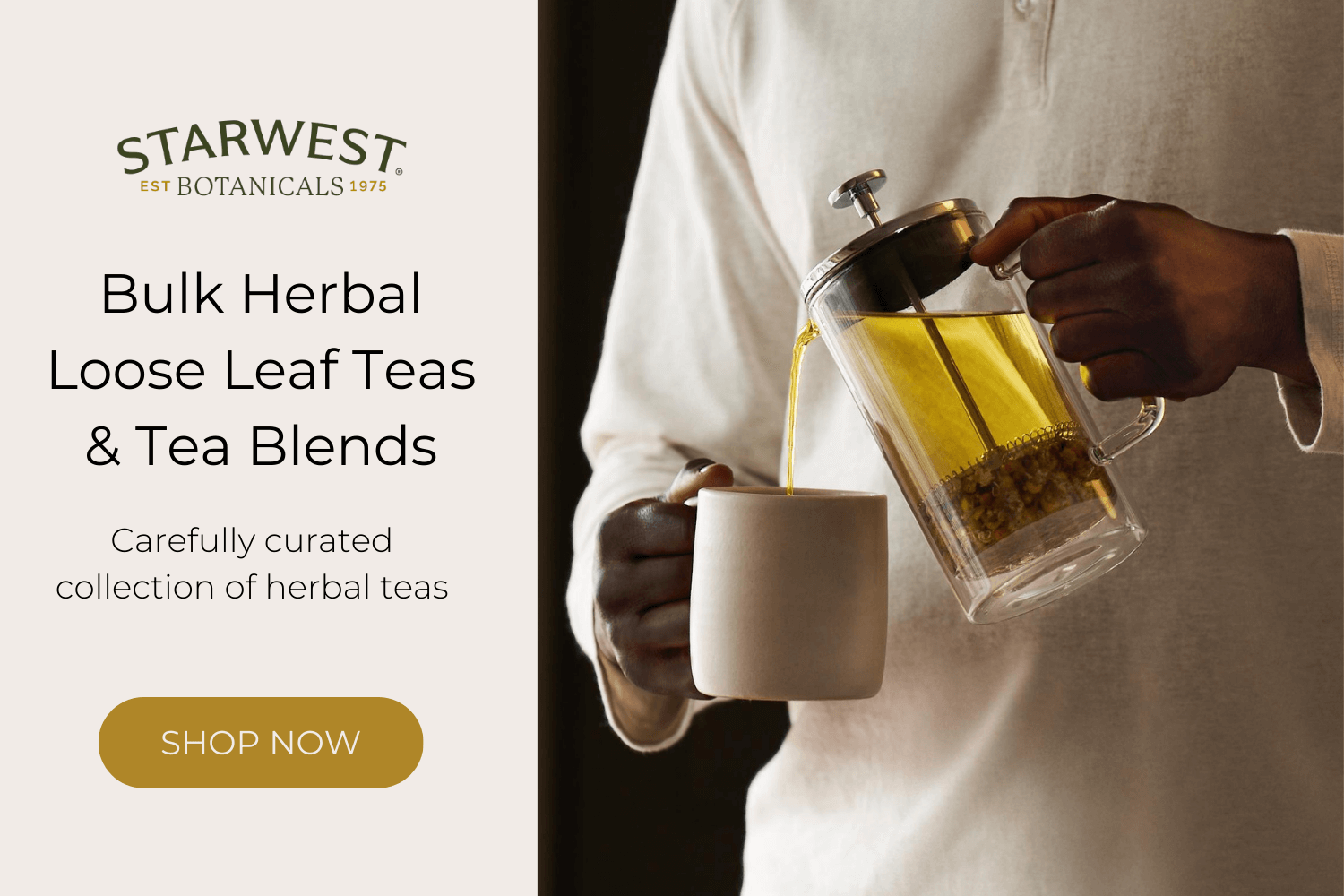The Complete Guide To Making Slippery Elm Tea | Starwest Botanicals
Posted by Daniel Powers on 06-21-2023

Slippery elm is a popular herb that’s used to support health and wellness.
One of the most popular uses for this plant is to make slippery elm tea. This tea, which is made with the bark of the slippery elm tree, not only has a good flavor, but it also may benefit your health in a variety of ways, especially digestive health.
If you’re interested in the health benefits of slippery elm tea, and want to try it for yourself, check out this helpful guide. And if you’re interested in a source for organic slippery elm, look no further than our full selection of dried slippery elm here at Starwest Botanicals.
What is Slippery Elm?
Slippery elm is a tree in the Ulmus (or elm”) family of plants. The Latin name for this tree is Ulmus rubra.
Slippery elm bark contains high amounts of mucilage. Mucilage is a slippery substance made out of polysaccharides that helps to soothe mucus membranes.
Due to mucilage content, slippery elm is considered a “demulcent”, which is a herb that has a soothing effect on the tissues of the body as it provides a slippery protective coating.
Slippery elm bark was a much-used herb in Native American medicine. It was historically used for respiratory support and gastrointestinal tract discomfort. It’s considered to be one of the most effective herbs to support digestive health.
The Potential Health Benefits of Slippery Elm Tea:
Below are the various health benefits of slippery elm tea.
- Digestive Health – Slippery elm tea has been used as a traditional remedy to soothe the digestive tract. A small clinical trial found that slippery elm powder helped to improve digestive function in 31 individuals. Additionally, slippery elm is also thought to benefit gut health through its ability to support healthy gut bacteria.
- Upper Respiratory Tract – Slippery elm can also be beneficial for the upper respiratory tract through its mucilage content. Mucilage provides a soothing layer on the mucus membranes of the throat and esophagus. This soothing coating can provide relief for dry tissues and coughs.
- Urinary System Comfort – Slippery elm has a historical use as an herbal remedy for soothing urinary tract discomfort. While it has a long history of traditional use in this area, its effectiveness has yet to be verified by scientific research.
- Hair Health – Slippery elm is also used to support strong, healthy hair. It’s thought to help retain moisture within the scalp. This herb is also said to be a useful detangler when applied topically. We include details on how to use slippery elm as a hair rinse below.
You can read more about the potential health benefits of slippery elm in our in-depth article here.

How To Make Slippery Elm Tea:
We have included an easy-to-follow slippery elm tea recipe below.
For best results, we recommend using slippery elm powder as it’s easier to use. However, you can also buy whole form slippery elm bark that you can grind up at home.
Slippery elm bark has a sweet, neutral flavor. It can be consumed by itself, or you can add extra herbs for added flavor and depth.
Slippery Elm Tea Recipe:
This is a great tea made with slippery elm powder. As stated above, if buying the whole form of slippery elm (or if you wildcrafted it yourself), you’ll want to grind it finely before making it into a tea.
Makes 1 cup
Ingredients Needed:
- 1 tablespoon of Organic Slippery Elm Powder
- 1 cup (8oz) of boiling water
Optional Ingredients:
- Honey (or sweetener of choice, Organic Stevia Powder is a great option).
- 1 lemon (for added flavor)
Instructions:
- Boil water in a kettle on the stove. Always use pure or spring water to create the best flavor.
- Add 8 oz of hot water to mug, place 1 tablespoon of slippery elm powder in a mug and stir until dissolved
- Add any extra ingredients (lemon, stevia, cinnamon, etc..)
- Allow to sit for 3-5 minutes (it will thicken slightly). Enjoy!
Notes:
Slippery elm has a pleasant, mild flavor with a sweet, maple-like finish. It goes well when added alongside other herbs. Adding cinnamon adds a nice flavor profile. You can also use slippery elm alongside marshmallow root (another soothing herb).
Slippery elm tea can also be used externally. Once a hot tea has been made, if you allow it to cool, you can use it as a hair rinse. Slippery elm benefits hair health through its various nutrients and moisture retention properties.
To use slippery elm for your hair, strain slippery elm tea and allow it to cool. Once cooled, gently massage into wet hair for 3-5 minutes. You can then detangle your hair with a wide-tooth comb. Once done, rinse your hair well to remove the slippery elm.
How to Add Slippery Elm Tea To Your Lifestyle:
Slippery elm is an easy herb to add to your wellness routine.
It can be taken on a needed basis when you are looking for soothing support for your digestive health or your upper respiratory tract. You can also take slippery elm daily - this herb is well-tolerated and provides a variety of health benefits.
As an added benefit, slippery elm tea is caffeine free, so it’s a guilt-free beverage that you can drink all day long.
It should be noted that slippery elm is also a great herb for dogs, check out our article here on the benefits of slippery elm for dogs.
In Closing:
Adding slippery elm tea to your routine is a great way to support your digestive health. With our slippery elm tea recipe, you are covered the next time you decide to brew up a batch.
Slippery elm tea is easy to make, making it a great option whether you're a well-seasoned tea drinker or a novice. With its pleasant flavor profile, it not only tastes good, but it may also provide your body with health benefits.
Here at Starwest Botanicals, we offer a variety of slippery elm products in bulk at wholesale pricing. Whether you’re looking for dried whole bark, powder, or slippery elm tea, we have you covered with our certified organic products.
Have you tried slippery elm tea before? What's your favorite way to add this beneficial herb to your diet?
Author Bio:
Daniel has a master's degree in herbal science from the Maryland University of Integrative Health. He's the founder of The Botanical Institute, where he writes about the health benefits of herbs.


